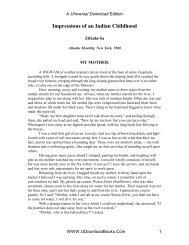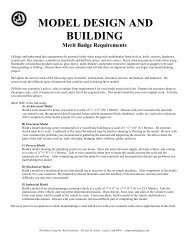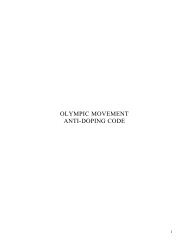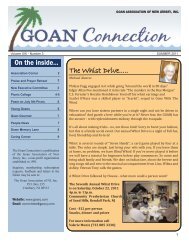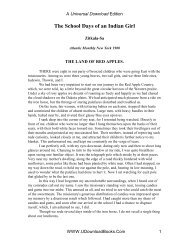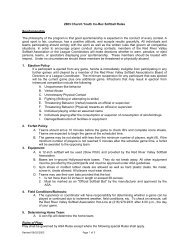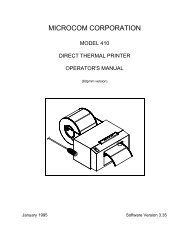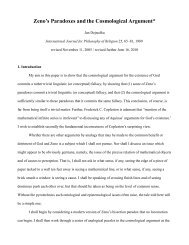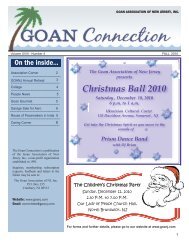Dummett's Backward Road to Frege and to Intuitionism - Tripod
Dummett's Backward Road to Frege and to Intuitionism - Tripod
Dummett's Backward Road to Frege and to Intuitionism - Tripod
You also want an ePaper? Increase the reach of your titles
YUMPU automatically turns print PDFs into web optimized ePapers that Google loves.
Quinean problems of inscrutability of reference <strong>and</strong> indeterminacy of translation implicitly abound in<br />
<strong>Frege</strong> as early as 1884 in Grundlagen § 22, where one card pack is also many cards, <strong>and</strong> as late as the<br />
permutation of red <strong>and</strong> green in “The Thought.” Dummett says, “In Grundgesetze, Volume I, §<br />
10,...<strong>Frege</strong> uses a permutation argument <strong>to</strong> show that the Bedeutungen of value-range terms have not<br />
yet been fixed. This appears <strong>to</strong> imply that he had ceased <strong>to</strong> believe that questions of reference are<br />
internal <strong>to</strong> language” (1995: 13). Indeed, the card pack <strong>and</strong> duality of geometry permutation arguments<br />
in Grundlagen appear <strong>to</strong> imply that <strong>Frege</strong> did not believe that questions of reference are internal <strong>to</strong><br />
language as early as 1884. 4 All this applies <strong>to</strong> purely logical names as well. Thus the sense <strong>and</strong><br />
reference of the identity name must assumed prior <strong>to</strong> any derivations of sense <strong>and</strong> reference for any<br />
other subsentential names—purely logical or otherwise— in the object-language (<strong>Frege</strong>’s formal<br />
notation) from the truth-conditions of statements in the object-language. Otherwise we beg the question<br />
of the identity of identity. Similarly for all the other primitive logical names. I think Dummett knows<br />
this. And I think that is why he is smuggling in our prior knowledge of the references <strong>and</strong> senses of all<br />
eight of <strong>Frege</strong>’s primitive logical names under the guise of their belonging <strong>to</strong> the logical form of<br />
statements. But their belonging <strong>to</strong> logical form scarcely hides their being subsentential names which<br />
express senses <strong>and</strong> refer <strong>to</strong> references. Elsewhere, Dummett says that the context principle “must apply<br />
<strong>to</strong> the logical constants as much as <strong>to</strong> other words” (2000: 252). Thus I think he must have option (2) in<br />
mind after all. But their references are “derived” (proved) only when all references are mutually fixed<br />
in Grundgesetze vol. 1, § 29, including identity! —Does § 29 contextually define all names, including<br />
the undefined logical names?<br />
The second problem is that of referential inscrutability of nonlogical terms. Even on option (2),<br />
i.e., already fixing the senses <strong>and</strong> references of all eight primitive logical names in the object-language,<br />
which eliminates the permutation problem for those eight names, <strong>and</strong> for all complex logical names<br />
defined in terms of them, the permutation problem remains for all nonlogical names, such as names of<br />
6




